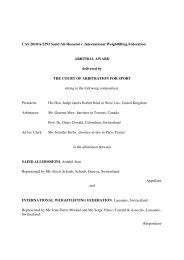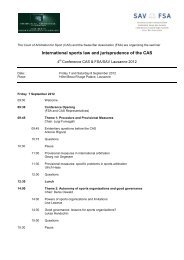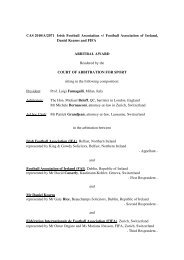(CAS) Bulletin - Tribunal Arbitral du Sport / TAS
(CAS) Bulletin - Tribunal Arbitral du Sport / TAS
(CAS) Bulletin - Tribunal Arbitral du Sport / TAS
You also want an ePaper? Increase the reach of your titles
YUMPU automatically turns print PDFs into web optimized ePapers that Google loves.
Arbitration C AS 2010/A/2083<br />
Union Cycliste Internationale (UCI) v. Jan Ullrich & Swiss Olympic<br />
9 February 2012<br />
Cycling; blood doping; disciplinary<br />
proceedings against a rider and Article<br />
75 Swiss Civil Code; initiation of<br />
disciplinary proceedings against a rider<br />
who is no longer a UCI licence-holder;<br />
probative value of the evidence leading<br />
to the conclusion that the rider engaged<br />
in blood doping; determination of the<br />
fi rst or the second infraction according<br />
to the 2009 WADC; fi rst or second<br />
violation for the calculation of the<br />
period of ineligibility; commencement<br />
of the Period of Ineligibility according<br />
to the UCI Rules<br />
Panel:<br />
Mr. Romano Subiotto QC (United Kingdom), President<br />
Prof. Ulrich Haas (Germany)<br />
Mr. Hans Nater (Switzerland)<br />
Relevant facts<br />
The Appellant, the International Cycling Union<br />
(UCI), is an international sporting federation and the<br />
world governing body for cycling, headquartered in<br />
Aigle, Switzerland. The UCI oversees competitive<br />
cycling events internationally and maintains a<br />
calendar of races in which its license-holders<br />
compete. Part 14 of the UCI Cycling Regulations that<br />
entered into force on August 13, 2004 were the Anti-<br />
Doping Cycling Rules of the UCI (the “ UCI Rules ”)<br />
in force throughout 2006. The UCI Rules adopt and<br />
implement the World Anti-Doping Code (WADC),<br />
as it stood at the time.<br />
The First Respondent, Jan Ullrich (“ Ullrich ”), is a<br />
German former professional road cyclist resident<br />
in Switzerland. Among other achievements, Ullrich<br />
was the winner of the 1997 Tour de France and the<br />
gold medallist in the men’s indivi<strong>du</strong>al road race at the<br />
Sydney 2000 Summer Olympic Games. Prior to the<br />
events in question in 2006, Ullrich was a member of<br />
the T-Mobile professional cycling team, a member of<br />
Swiss Cycling, and a UCI license-holder.<br />
The Second Respondent, Swiss Olympic, is the<br />
National Olympic Committee of Switzerland.<br />
An independent body within Swiss Olympic, the<br />
Disciplinary Chamber, issued the fi rst instance award<br />
against which the UCI appeals (the “ Decision ”). In a<br />
letter from its Deputy Director, Hans Babst, dated<br />
December 15, 2010, Swiss Olympic advised that it<br />
“ does not wish to be actively involved in the present proce<strong>du</strong>re, ”<br />
and “confi rms that it will abide by any decision the Panel will<br />
reach in the present proce<strong>du</strong>re ”.<br />
Ullrich is a retired professional cyclist who has been<br />
resident in Switzerland since 2003. Prior to taking up<br />
residence in Switzerland, Ullrich was a resident of his<br />
native Germany. The UCI has provided evidence that<br />
in 2002, Ullrich tested positive for amphetamines out<br />
of competition. At the time of his original infraction<br />
the UCI and the German national cycling federation<br />
(BDR), of which Ullrich was a member, both banned<br />
the presence of amphetamines in athletes in all<br />
circumstances.<br />
This ban extended to out of competition testing.<br />
As a result of the positive test, Ullrich was subject<br />
to antidoping disciplinary proceedings by the BDR<br />
and suspended by its association tribunal (“ BDR<br />
Bundessportgericht ”) by a decision dated July 23, 2002.<br />
The BDR Bundessportgericht at the time took into<br />
account that Ullrich was at the time of the infraction<br />
in hospital, suffering from depression, and did<br />
not take amphetamines to improve his sporting<br />
performance. In addition, Ullrich at the time admitted<br />
taking amphetamines. Given Ullrich’s antidoping<br />
violation, the BDR Bundessportgericht was obligated<br />
to impose a sanction of ineligibility of between six<br />
and 12 months under the rules applicable to that<br />
case; in view of the circumstances already described,<br />
it imposed the minimum period of ineligibility – a six<br />
month suspension. The BDR Bundessportgericht’s<br />
decision was not appealed at the time, and the timelimit<br />
for any appeal has long expired.<br />
Upon Ullrich’s relocation to Switzerland until the<br />
events in question, he was a member of the Swiss<br />
Cycling Federation (“ Swiss Cycling ”), and through the<br />
auspices of Swiss Cycling was a UCI-license holder.<br />
By a form signed and dated November 24, 2005,<br />
Ullrich applied for and obtained a UCI license for<br />
the 2006 calendar year.<br />
In 2004, the Spanish Guardia Civil and the<br />
Jurisprudence majeure / Leading cases<br />
-<br />
57





